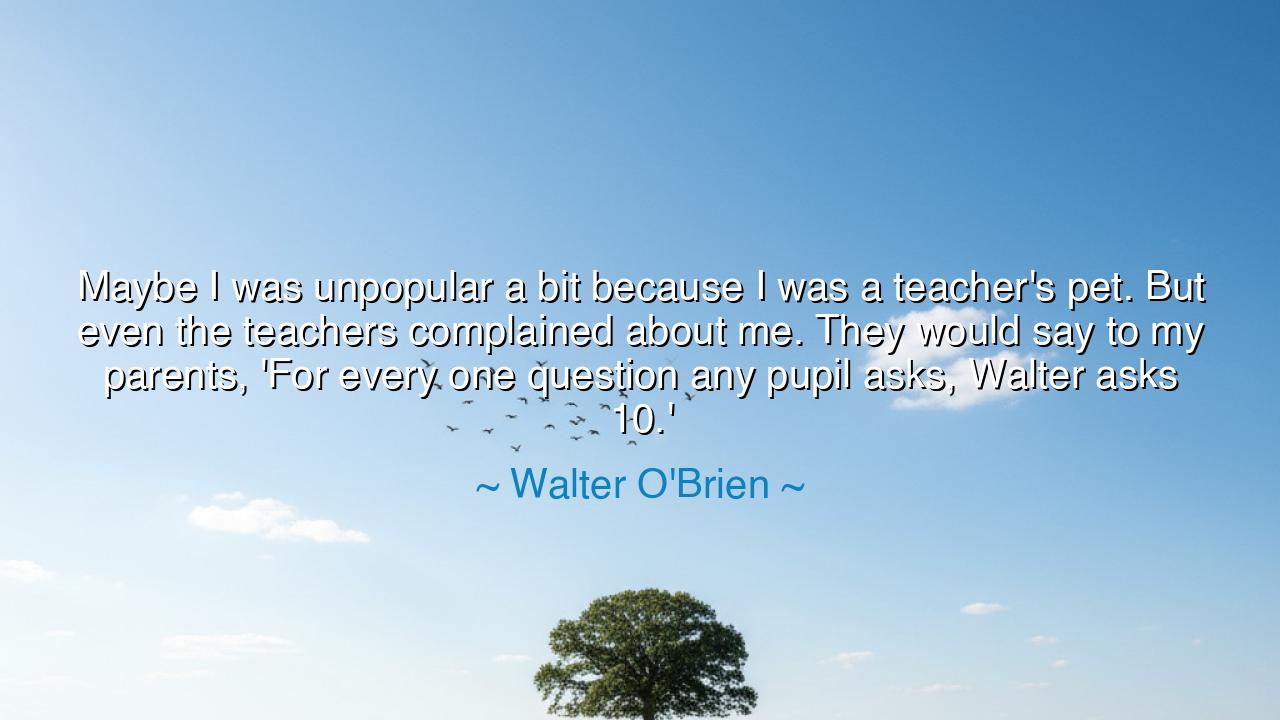
Maybe I was unpopular a bit because I was a teacher's pet. But
Maybe I was unpopular a bit because I was a teacher's pet. But even the teachers complained about me. They would say to my parents, 'For every one question any pupil asks, Walter asks 10.'






Hear now, O seeker of knowledge, the words of Walter O’Brien, who confessed with both candor and pride: “Maybe I was unpopular a bit because I was a teacher’s pet. But even the teachers complained about me. They would say to my parents, ‘For every one question any pupil asks, Walter asks ten.’” At first, these words may seem like the musings of a mischievous boy who tried the patience of his mentors. Yet beneath them lies a treasure of wisdom: that the hunger for truth is often misunderstood, and that the spirit of inquiry, though it may weary others, is the root of discovery and greatness.
The ancients, too, spoke of such restless questioning. Socrates, the gadfly of Athens, wandered through the streets and marketplaces asking endless questions. To the powerful, he was an annoyance, a thorn that pricked their certainty. To the common people, he seemed strange and relentless. Yet through his questions, he uncovered wisdom deeper than gold, so much so that his name is remembered while the names of his accusers fade into shadow. In Walter’s story, as in Socrates’, we see that the one who asks ten questions while others ask but one is not a burden, but a spark of light in a world that often prefers the dim comfort of ignorance.
Yet such souls are rarely popular. The crowd values conformity, the rhythm of sameness, the safety of not standing out. The one who questions too much disturbs the order, challenges the teacher, and unsettles the rest. Just as fire both warms and burns, so too does the relentless mind inspire some while irritating others. Walter’s words remind us of this paradox—that brilliance may come wrapped in the cloak of unpopularity, and that true seekers often stand apart.
Consider also the story of young Thomas Edison, who was cast out of school because his teachers thought him slow and unruly, forever interrupting with questions. His own mother chose to teach him at home, nurturing the very spirit others rejected. From that unyielding curiosity came the lightbulb, the phonograph, and countless other wonders that shaped the modern world. What was once deemed disruptive became the seed of genius. Walter O’Brien’s tale is a reflection of that same eternal pattern: that those who ask more than others often become those who give more than others.
O listener, take this to heart: it is better to be the one who asks too many questions than the one who asks none. Better to face the scorn of teachers, peers, or society than to silence the fire within. For the act of questioning is the act of growth, and growth is the path to wisdom, invention, and truth. Though the world may complain, it is from the mouths of the restless that the future is spoken.
And yet, let there be balance. The wise seeker does not merely question to irritate or to boast, but to learn. The aim of asking ten questions is not to drown others in noise, but to dig ten times deeper into the soil of understanding. Let every question be born of genuine curiosity, not vanity, and let every answer be received with humility. In this way, the spirit of inquiry becomes not a burden, but a blessing.
Therefore, the lesson is clear: do not silence your curiosity for the sake of popularity. Do not abandon your hunger for truth because others are content with the surface. Be like Walter O’Brien, like Edison, like Socrates—willing to stand apart, to bear complaint, to be called strange. Ask, seek, knock, and the doors of knowledge will open before you.
Thus I say to you, O children of tomorrow: guard your curiosity as a sacred flame. Ask boldly, learn humbly, and persist bravely. For though the world may weary of your questions, it is by such questions that the path of human progress is carved.






AAdministratorAdministrator
Welcome, honored guests. Please leave a comment, we will respond soon